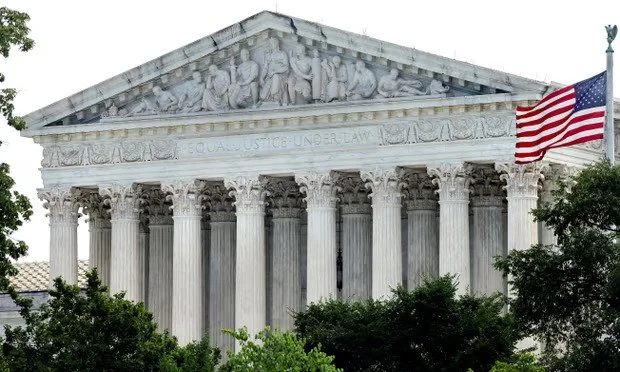There’s a danger that the US supreme court, not voters, picks the next president



‘The conservative legal movement and the court’s own decisions, time and again, have made it easier for a contested election to land on its doorstep.’ Photograph: Evelyn Hockstein/Reuters
Millions of Americans will vote this fall – but six Republican justices might have the final say, in a Bush v Gore redux
by David Daley
It’s frighteningly easy to imagine. Kamala Harris wins Georgia. The state elections board, under the sway of its new Trump-aligned commissioners, grinds the certification process to a slow halt to investigate unfounded fraud allegations, spurring the state’s Republican legislature to select its own slate of electors.
Perhaps long lines in Philadelphia lead to the state supreme court holding polls open until everyone has a chance to vote. Before anyone knows the results, Republicans appeal to the US supreme court using the “independent state legislature” (ISL) theory, insisting that the state court overstepped its bounds and the late votes not be counted.
Or maybe an election evening fire at a vote counting center in Milwaukee disrupts balloting. The progressive majority on the state supreme court attempts to establish a new location, but Republicans ask the US supreme court to shut it down.
Maybe that last example was inspired by HBO’s Succession. But in this crazy year, who’s to say it couldn’t happen? The real concern is this: if you think a repeat of Bush v Gore can’t happen this year, think again.
There are dozens of scenarios where Trump’s endgame not only pushes a contested election into the courts, but ensures that it ends up before one court in particular: a US supreme court packed with a conservative supermajority that includes three lawyers who cut their teeth working on Bush v Gore, one whose wife colluded with Stop the Steal activists to overturn the 2020 results, and another whose spouse flew the insurrectionist flag outside their home.
That’s why those scenarios should cause such alarm, along with very real actions and litigation over voting rolls already under way in multiple states. Meanwhile, in Georgia, Arizona, Texas and elsewhere, Republican legislators and boards that might otherwise fly under the radar are busy changing election laws, reworking procedures, altering certification protocols, purging voters and laying the groundwork for six weeks of havoc after Americans vote on 5 November but before the electoral college gathers on 17 December.
Lower courts may brush aside this mayhem, as they did after the 2020 election. But if the election comes down to just one or two states with a photo finish, a Bush v Gore redux in which the court chooses the winner feels very much in play. The court divided along partisan lines in 2000; its partisan intensity, of course, has greatly intensified in the two decades since.
What’s terrifying is that the court has already proved the Republican party’s willing ally. The Roberts court laid much of the groundwork for this chaos in a series of voting rights decisions that reliably advantaged Republicans, empowered Maga caucuses even in swing states, then unleashed and encouraged those lawmakers to pass previously unlawful restrictions based on evidence-free claims of voter fraud.
Right now in Georgia, a renegade state election board – with Trump’s public gratitude – has enacted broad new rules that would make it easier for local officials to delay certifying results based on their own opinion that “fraud” occurred. Democrats have filed suit to block these changes; even the Republican governor, Brian Kemp, has sought to rein them in. But if those efforts fail, it could create a cascade of litigation and missed deadlines in perhaps the closest state of all.
That, in turn, could jeopardize the certification of Georgia’s slate of electors – and even encourage the Republican state legislature, a hotbed of election denialism in 2020, to select their own.
If that creates a terrifying echo of Bush v Gore, it should. In his influential 2000 concurrence, then chief justice William Rehnquist noted that Florida’s legislature would have been within its rights to name electors if court challenges threatened the state’s voice from being heard as the electoral college met. (A young Brett Kavanaugh explained the nascent independent state legislature theory to Americans during Bush v Gore; on the bench two decades later he would elevate it in a Moore v Harper concurrence that weaponized it for this post-election season.)
Georgia’s not-so-subtle chicanery was enabled by the court’s 2013 decision in Shelby county v Holder, which freed state and local entities in Georgia, Arizona and elsewhere from having to seek pre-approval before making electoral changes.

